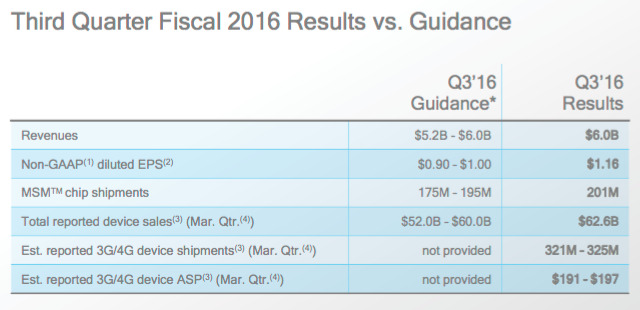Qualcomm reported strong quarterly earnings of $1.4 billion— an 18.6 percent increase over the year ago quarter— based on higher intellectual property licensing royalties, a jump in chip orders from China and guidance-exceeding MSM chip sales, indicating that the market for premium smartphones is continuing to grow faster than expected.
Qualcomm profits up despite flat revenues
Qualcomm's technology powers most premium smartphones, and is essentially almost required to connect to the fastest mobile networks. The company builds cellular modem chips used in Apple's iPhone, as well as its own Snapdragon line of MSM Application Processors used in many premium Android phones.
In China, the company is struggling to force other chipmakers— including iPhone-cloner Meizu— to license its technology, an uphill battle in a country where intellectual property is often poorly enforced.
Qualcomm makes most of its money from licensing. This quarter was the first in the last year where the firm didn't experience a double-digit decline in revenues. However, its overall revenues were only up 3.6 percent, indicating that its profitability is increasing much faster than its sales.
The company explained that its earnings were higher this quarter "based on meaningful progress with licensees in China."
The company also stated that it was "benefiting from a strong new product ramp across tiers, particularly with fast growing OEMs in China," and noted that its MSM chips— which power higher-end smartphones— achieved sales of 201 million units in the quarter, higher than the 175-195 million units it expected in its earlier guidance.
The false narrative of Peak iPhone
A report by Ian King for Bloomberg bizarrely claimed that "Chinese handset makers and Samsung have gained share against Apple, helping boost demand for Qualcomm's processors and modems," a statement that makes no sense.
All iPhones currently use Qualcomm chips, while Samsung uses a mix of Qualcomm chips and some of its own internally-developed Exynos chips using an integrated modem.
Further, many of the "market share expanding" high-volume phone makers in China use cheaper components rather than Qualcomm's premium chips, so sales of fewer iPhones would hurt, not benefit Qualcomm.
Apple rumored to be moving to Intel modems
Apple has relied on Qualcomm's modem chips (also called the Baseband Processor) in iPhones since the release of iPhone 4 for Verizon. Qualcomm chips were required to work with Verizon's CDMA network.
However, this fall iPhone 7 is expected to begin using new modem chips built by Intel. In April, Qualcomm's chief executive Steve Mollenkopf said he was "assuming" a major client would be turning modem orders over to another firm, a clear reference to Apple.
Apple will announce its own earnings next Tuesday. The company is expected to post a second quarter of sales below the high water mark set by iPhone 6 last year, although this quarter is also expected to benefit from new sales of the compact iPhone SE.
That new model has a lower price but likely similar margins to Apple's iPhone 6/6s product lineup. That could result in a lower Average Selling Price for iPhones— estimated to dip as low as $637 from the typical iPhone ASP of around $650.
In comparison, Qualcomm reported an ASP trend across phones using its chips falling below $200 to reach $194 in the March quarter.
 Daniel Eran Dilger
Daniel Eran Dilger







-m.jpg)






 Malcolm Owen
Malcolm Owen
 Amber Neely
Amber Neely


 Christine McKee
Christine McKee

 Chip Loder
Chip Loder
 Marko Zivkovic
Marko Zivkovic









6 Comments
If Qualcomm chips are in phones at the $200 ASP, then how can you imply that premium smartphones were responsible for their growth?
Hang on. Weren't you telling us that Qualcomm were doomed a couple of months back?
There may be a disconnection between the author and the facts?
Even according to the AI article Qualcomm says " that it was "benefiting from a strong new product ramp across tiers, particularly with fast growing OEMs in China," and noted that its MSM chips--which power higher-end smartphones--achieved sales of 201 million units in the quarter, higher than the 175-195 million units it expected in its earlier guidance."
Which the author then puts down as bizarre if claiming "Chinese handset makers... have gained share against Apple, helping boost demand for Qualcomm's processors and modems," going on to say it's "a statement that makes no sense." Why does it not make sense? Apple would not be one of those "fast-growing OEM's in China".